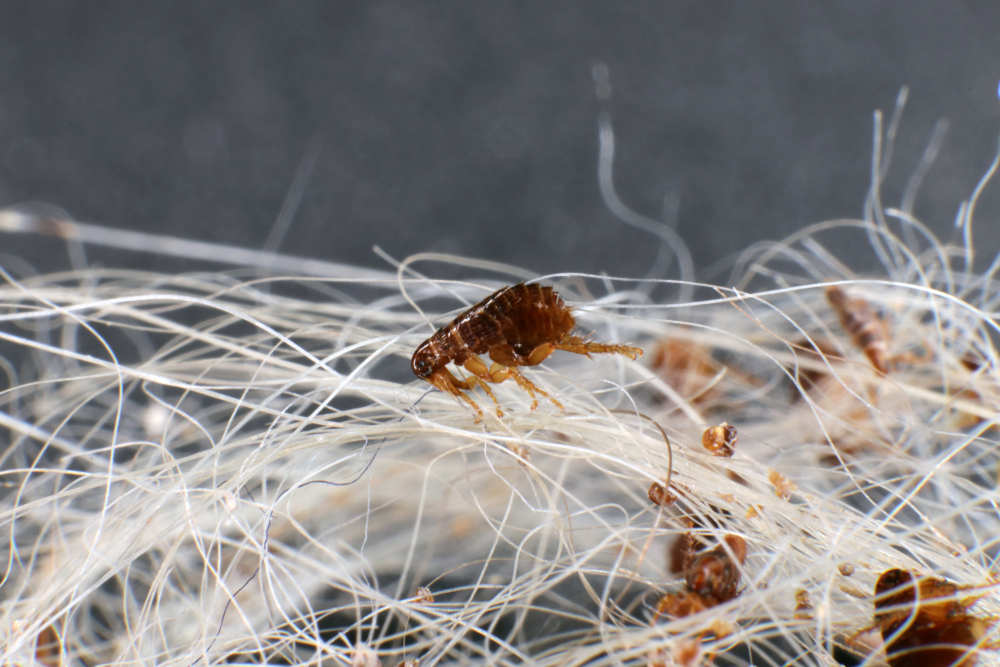Many pet owners are tempted to postpone their pet’s parasite prevention program through the winter, but these pests can cause dangerous issues for your pet year-round. Our team at Pioneer Animal Hospital received input from some pesky parasites to explain why year-round parasite prevention is paramount to protect your pet.
Ferdinand the flea’s feedback: “When the temperatures start to dip below freezing, my habit is to hitch a ride on an unsuspecting pet to make myself comfortable in a warm, comfy home.”
Pioneer Animal Hospital (PAH): Fleas can remain active in near-freezing conditions, and in Kansas, peak flea season goes into November. If temperatures are becoming uncomfortable for these parasites, they will typically seek a warmer domain, such as your house, to ride out the cold weather. Fleas can cause several issues for your pet, including:
- Anemia — Fleas can ingest 15 times their body weight in blood, and if your pet has a large flea load, they can become anemic. Puppies, kittens, and senior pets are at higher risk. Signs include weakness and pale mucous membranes. In severe cases, blood transfusions may be needed to replenish your pet’s blood supply.
- Flea allergies — Flea bite dermatitis, which is one of the most common dermatologic conditions seen in cats and dogs, causes significant discomfort to affected pets. Signs include continuous, excessive scratching, biting, chewing, and rubbing. All fleas must be removed from your pet’s body and environment to alleviate their distress.
- Tapeworms — Fleas can transmit tapeworms to your pet if they ingest an infected flea while grooming. These parasites mature in your pet’s gastrointestinal tract, and attach to the intestinal lining to feed. Signs include weight loss and irritation to your pet’s hind end, often exhibited by scooting behavior. You may also find tapeworm segments, resembling rice grains, on your pet’s hind end or in their feces. Our veterinary professionals will prescribe an appropriate deworming medication if your pet has tapeworms.
Titus the tick’s take: “Cold weather doesn’t stop me! When I get hungry, chilly temperatures don’t discourage me from finding a furry, four-legged dining spot to satisfy my appetite.”
PAH: Ticks are encountered year-round in Kansas, and a tick that remains attached to your pet for an extended period can transmit serious diseases.
- Tick-borne diseases — Diseases, such as Lyme disease, Rocky Mountain spotted fever, ehrlichiosis, and anaplasmosis, are bacterial infections transmitted by certain tick species. Signs are often generalized, and include lethargy, fever, swollen lymph nodes, joint pain, and decreased appetite. These diseases are usually responsive to a particular drug class and, depending on your pet’s condition, treatment may take weeks or months to eradicate the infection.
- Tick paralysis — This condition occurs when your pet’s nervous system reacts to a neurotoxin secreted by a pregnant female tick’s salivary glands. Signs usually present suddenly and progress quickly. Initially, your pet may stumble or exhibit weakness in their hind limbs, and then, over one to three days, the condition may progress to all four limbs. They may also have trouble swallowing or breathing, if the muscles in these areas are affected. The best treatment for tick paralysis is tick removal, and your pet will need to be hospitalized until their signs improve.
Henrietta the heartworm’s response: “Unpredictable weather fluctuations allow me to take advantage of lapses in heartworm prevention, so I can expand my family in your pet’s heart.”
PAH: Heartworms are transmitted by an infected mosquito’s bite, which releases baby heartworms, called microfilariae, into your pet’s bloodstream. These microfilariae mature and cause damage to your pet’s heart, lungs, and vasculature. Pets are affected differently, depending on their species.
- Dogs — Dogs are natural heartworm hosts, which means the heartworm can mature, mate, and reproduce in your dog’s heart. Signs tend to be absent in the early stages, but as the disease progresses, signs include a mild cough, fatigue after moderate exercise, and weight loss. Treatment for heartworm disease can not only be difficult, but also fatal if your dog has a heavy parasite load, or their activity level isn’t severely restricted.
- Cats — Since cats are not natural heartworm hosts, the parasites don’t typically reach full maturity, but the immature worms can still cause significant problems for your cat. Signs are rare in the early stages, but as the disease progresses, signs include difficulty breathing, weight loss, difficulty walking, and sudden collapse or death. No treatment is available for heartworm disease in cats, which makes prevention much more critical.
Ingrid the intestinal parasite’s input: “Your pet’s warm body allows me and my kind to complete our life cycle. When you stop administering parasite prevention to your pet in the winter, we are able to thrive.”
PAH: Intestinal parasites, such as tapeworms, hookworms, whipworms, roundworms, giardia, and coccidia, are transmitted when your pet contacts objects contaminated by infected feces. These parasites attach to your pet’s gastrointestinal tract to leach their nutrients. Signs include diarrhea, weight loss, unkempt hair coat, and lethargy. Regular fecal exams can help determine if your pet is affected by intestinal parasites, and appropriate deworming medications will be prescribed to eradicate the problem.
Year-round parasite prevention is essential to provide the necessary wellness protection for your pet. If you would like to discuss what parasite prevention measures are best for your pet, contact our American Animal Hospital Association (AAHA)-accredited team at Pioneer Animal Hospital, so we can keep them critter-free.


